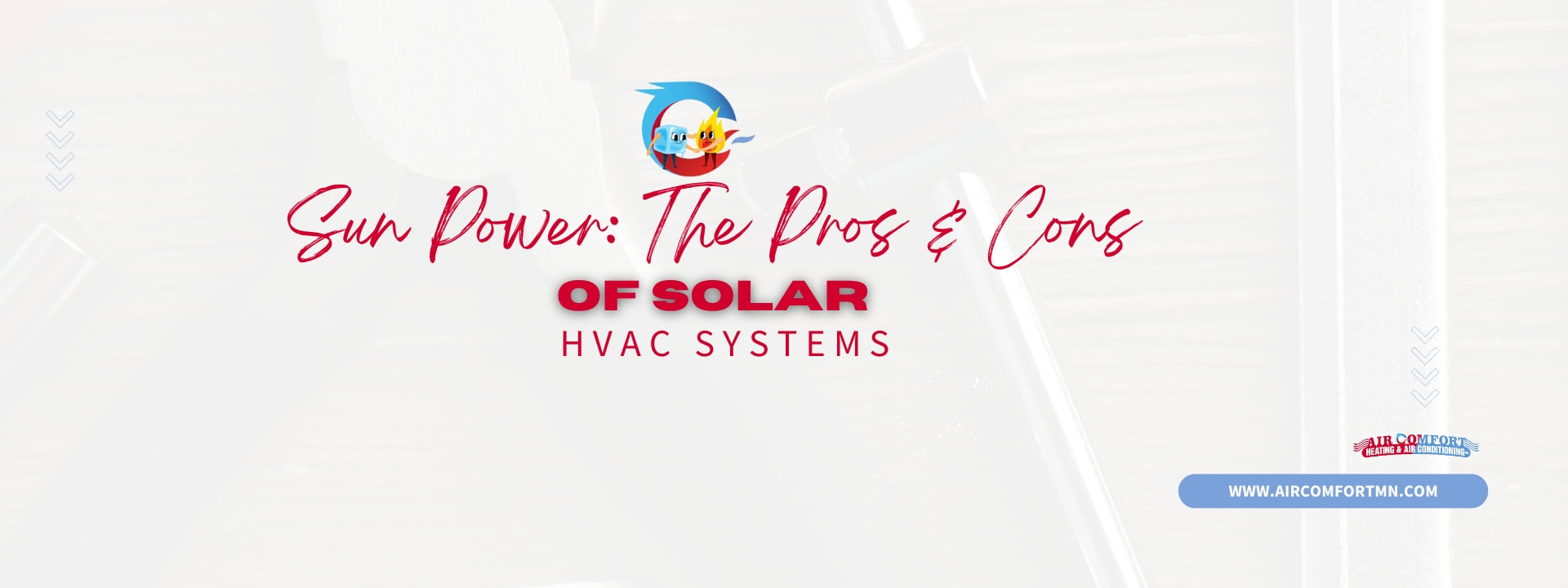|
As sustainability becomes more crucial in our daily lives, homeowners are increasingly turning to solar technology to power their homes. Solar HVAC systems, which use solar energy to heat and cool homes, are gaining popularity for their eco-friendliness and potential cost savings. However, like any technology, they come with both advantages and challenges. Let's delve into the pros and cons of solar HVAC systems to help you determine if they're the right fit for your home.
What is a Solar HVAC System? A solar HVAC system integrates solar panels with traditional heating and cooling mechanisms. The solar panels collect solar energy and convert it into electrical power, which then operates the HVAC system. This setup can significantly reduce reliance on grid electricity, tapping into the abundant and free energy provided by the sun. Pros of Solar HVAC Systems Energy Savings: One of the most appealing aspects of solar HVAC systems is the potential for substantial energy savings. By using solar power, these systems can reduce your electricity bills, especially during peak usage times. Environmental Impact: Solar HVAC systems contribute to a lower carbon footprint. Using renewable solar energy instead of fossil fuels to power your HVAC system helps reduce greenhouse gas emissions, aligning with global efforts to combat climate change. Increased Home Value: Homes equipped with solar energy systems often see an increase in property value. Buyers are increasingly looking for homes with sustainable features that promise long-term savings. Long-Term Savings: Although the initial investment might be high, the long-term savings from reduced energy bills can offset the upfront costs. Additionally, many governments offer incentives for installing solar energy systems, making it a financially viable option over time. Cons of Solar HVAC Systems High Initial Investment: The major barrier for many homeowners is the high initial cost of purchasing and installing solar panels and integrating them with an HVAC system. Dependence on Weather: The efficiency of solar HVAC systems heavily depends on sunlight availability. In areas with less sunny weather or during periods with shorter daylight hours, the system's efficiency might decrease, requiring reliance on grid electricity. Maintenance: Solar panels and the additional components of a solar HVAC system can require maintenance more frequently than traditional systems. This includes keeping panels clean and free of debris to maintain optimal performance. Space Requirements: Installing a sufficient number of solar panels to effectively power an HVAC system requires adequate roof space. Homes with limited or shaded roof areas might face challenges in installing a solar HVAC system. Considerations Before Installation Before deciding to install a solar HVAC system, consider your local climate, the orientation and condition of your roof, and your current energy needs. It’s also beneficial to consult with a professional to analyze your home’s suitability for a solar HVAC system and to understand the potential return on investment. Solar HVAC systems offer a promising alternative for those looking to reduce their environmental impact and energy costs. While they require a significant initial investment and are dependent on geographical and environmental factors, the long-term benefits can be substantial. If you’re exploring ways to make your home more sustainable, a solar HVAC system could be a step in the right direction. Interested in learning more about solar HVAC systems or considering an installation? Contact Air Comfort today.
0 Comments
Leave a Reply. |
AuthorVarious. Archives
July 2024
Categories
All
|
CALL NOW: 763-753-6623
Privacy Policy l Cookie Policy l Conditions of Use l Notice and Take Down Policy l Website Accessibility Policy
© 2024 The content on this website is owned by us and our licensors. Do not copy any content (including images) without our consent.
Website managed by Go Savvy Social
Privacy Policy l Cookie Policy l Conditions of Use l Notice and Take Down Policy l Website Accessibility Policy
© 2024 The content on this website is owned by us and our licensors. Do not copy any content (including images) without our consent.
Website managed by Go Savvy Social


 RSS Feed
RSS Feed